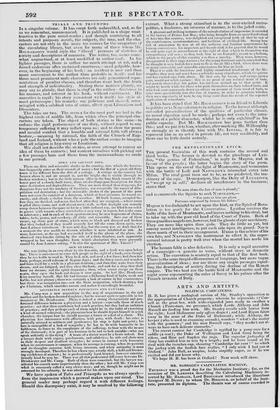THE REVOLUTIONARY EPICK.
THE present fasciculus of this work contains the second and third books. The former is devoted to time pleadings of Lyri- don, "the genius of Federalism," in reply to Magros, and in favour of the people ; the latter begins the story of the poem. This opens on the eve of the fight of Montenotte, and terminates with the battle of Lodi and NAPOLEONS triumphal entry into Milan. The rival genii turn out to be, as we predicted, the ma- chinery of the epic. Demogorgon, like the Deity of LUCRETIUS, is " wrapt up in self;" declines all interference in the business; states that
"In man alone the fate of man is placed ;"
and recommends the Spirits to seek NAPOLEON,- " For unto to lihn are given Fortunes unproved by human life before."
Magros is too disdainful to act upon the hint, or the Spirit of Revo- lution is too quick for the Conservative. Lyridon receives the fealty of the hero of Montenotte, and leaves nothing to his rival, but. to take up with the poor old head of the Court of Turin. Both of these guardian angels are, however,but.the ghosts of epic machinery. They are more like spies than gods. They do little as yet, but convey secret intelligence, to put each side upon its guard. Nor is there much of art in their management. If man is the arbiter of his own fate, and NAPOLEON the instrument to effect it, the super- natural interest is pretty well over when the mortal has made his election.
The human fable is also defective. It is only a rapid narrative of a campaign—a gazette in verse, without story or dramatic action. The execution is scarcely equal to that of the first book. There is the same turgid efflorescence of language, but more vague generalization of ideas ; nor are there any single passages equal- ling the description of society during the decline of the Roman empire. The two best are the battle field of Montenotte and the night scene representing the ruler of Savoy in his palace after the French invasion of Italy.






















 Previous page
Previous page